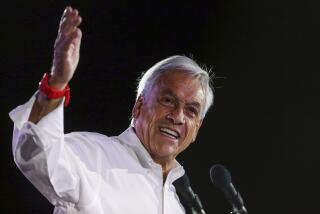History Will Judge, Quayle Says of Pinochet : Diplomacy: The departing strongman equates his bloody 1973 coup with democratic revolts in Eastern Europe.
SANTIAGO, Chile — Vice President Dan Quayle, bidding farewell to the last dictator on the South American Continent, said Sunday after meeting with Gen. Augusto Pinochet that after 16 years of strongman rule, the Chilean leader’s place in history will be judged by his decision to turn the government over to a democratically elected president.
For his part, Pinochet equated the bloody coup in 1973, in which the armed forces and police overthrew the Marxist-led government of President Salvador Allende, with the democratic revolutions that have rocked Eastern Europe. Pinochet told Quayle:
“We weren’t understood. What is happening with the Berlin Wall, East Berlin, Europe--that happened to us here 16 years ago.”
Quayle’s day in Santiago, the capital, and in Valparaiso, now the seat of Congress where Patricio Aylwin was inaugurated as president, presented a sharp contrast with his political life at home.
A conservative crowd of several hundred Pinochet supporters jeered him--as a representative of a U.S. government that has been pressing for a return to democracy in Chile--when he arrived at Pinochet’s residence. The well-appointed crowd--some members wore jewelry, and Sony Walkman headphones were in evidence--shouted obscenities at him.
At home, Quayle generally is applauded by conservatives.
As he drove to Aylwin’s inauguration--his main reason for visiting Chile--Quayle stopped to shake hands at a street corner in a working-class neighborhood where the new president’s supporters flocked around the visiting U.S. politician and applauded.
The visit to Chile has posed something of a dilemma for the Bush Administration.
Although it is a celebration of democracy and harmony--Sen. Edward M. Kennedy (D-Mass.), one of the most outspoken congressional critics of the Pinochet regime, accompanied Quayle--it has also called attention to the coup that brought Pinochet to power and to reports at the time of U.S. support for the coup.
Quayle, who told reporters as he flew to Santiago that “there is nothing the United States should apologize for” in its past relations with Chile, said after his 35-minute session with Pinochet in his home that he told the general that “his role in history is just beginning to be recorded.”
More to Read
Sign up for Essential California
The most important California stories and recommendations in your inbox every morning.
You may occasionally receive promotional content from the Los Angeles Times.










